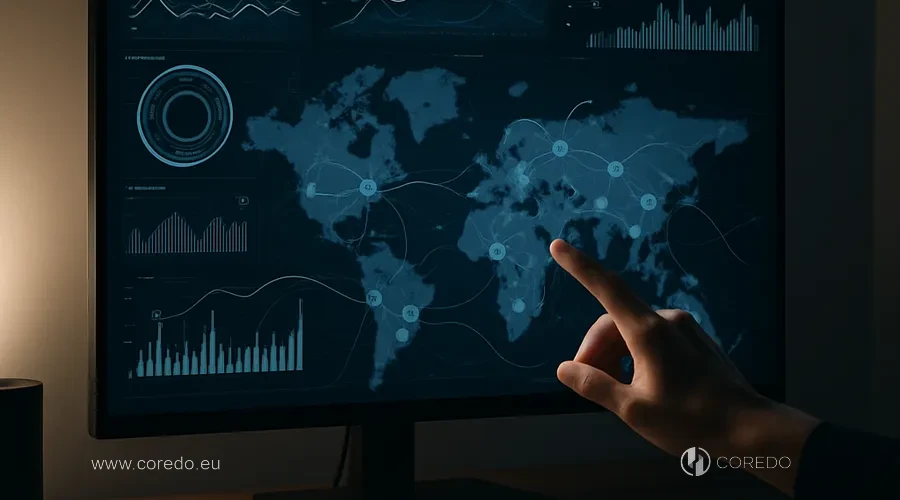In 2024 more than 60% of corporate fraud cases in Europe and Asia were detected thanks to the analysis of open-source data, OSINT. At the same time, the damage from undetected risks when choosing foreign partners or registering companies in new markets can reach tens of millions of euros. Why are even experienced entrepreneurs and chief financial officers vulnerable to complex schemes and hidden threats? How to control reputational, financial and legal risks in a world where information becomes the main asset, and its reliability: the key factor of success?
At COREDO we see how OSINT data checks are becoming the standard for registering legal entities in the EU, Asia, the UK, Singapore and Dubai, as well as for assessing partners’ reliability and managing corporate security.
OSINT data verification: methods and tools

OSINT data verification is based on the use of various methods and tools for searching, verifying and analyzing information from open sources. This approach uses both technical means and analytical techniques that allow a comprehensive assessment of the reliability of the obtained data and the identification of hidden connections.
Classification of OSINT analysis methods
Over years of work the COREDO team has implemented dozens of projects where OSINT data verification from open sources became a key element of comprehensive business support. In modern practice several approaches are distinguished:
- Manual collection of information from open sources – analysis of corporate registers, court decisions, media publications, social media profiles. This approach allows deep immersion into details but requires significant time and a high level of expert qualification.
- OSINT automation: using specialized OSINT frameworks and parsing scripts to collect large volumes of data from government and commercial registers, aggregators, and specialized databases. This speeds up the process and minimizes the human factor, especially for mass checks of counterparties or registration of legal entities in multiple jurisdictions.
- SOCMINT (Social Media Intelligence): analysis of social networks for reputation monitoring, identifying affiliated persons, assessing public activity and hidden connections. At COREDO we use SOCMINT to detect potential conflicts of interest and analyze reputational risks when entering new markets.
- Parsing and web scraping: automated collection of information from open registers, corporate websites, tender platforms. Solutions developed at COREDO allow integrating parsing with internal CRM and ERP systems, providing a continuous flow of up-to-date data.
- Geolocation analysis – verification of the accuracy of addresses, locations of assets and branches using tools like GeoIQ, Google Maps, OpenStreetMap. This approach is especially in demand when registering companies in the EU and Asia, where requirements for address confirmation and physical presence are constantly tightening.
- Visualization of links, building connection graphs between legal entities and individuals using Maltego, which allows quickly detecting hidden affiliated structures, chains of ownership and risks of conflicts of interest.
- Use of AI and machine learning – modern OSINT tools with artificial intelligence and Natural Language Processing (NLP) greatly increase analysis accuracy, enable detection of fraud patterns, automate processing of big data and forecast risks.
At COREDO we are convinced that a competent choice of OSINT tools is critically important for verification effectiveness; below we will consider the top-5 solutions that have proven their practical value.
Top 5 OSINT tools for search and analysis
| Tool | Purpose | Integration features |
|---|---|---|
| Maltego | Link visualization, graphs | Plugin and API support |
| SpiderFoot | Automated data collection | Flexible settings, reporting |
| Shodan | Cyber reconnaissance, device monitoring | Infrastructure vulnerability search |
| theHarvester | Collection of emails, domains, subdomains | Integration with other tools |
| Google Dorks | Search for hidden data on the internet | Free, requires skills |
At COREDO we actively use these tools to vet counterparties, analyze corporate structures and monitor reputational risks. For example, Maltego enables rapid construction of connection graphs between companies and beneficiaries, while SpiderFoot automates the collection of information from dozens of sources, including court and government registers. Implementing OSINT frameworks with AI and machine learning support allows us to significantly increase the effectiveness of due diligence and AML processes, especially when working with companies from the EU, Singapore and Dubai.
Application of OSINT in company registration and support

The application of OSINT in company registration and support provides unique opportunities for collecting and analyzing information from open sources, which significantly reduces risks and helps to make ob
Informed decisions at all stages of working with counterparties and partners. Thanks to OSINT, companies can effectively identify potential threats, verify the reliability of market participants, and ensure transparency of business processes.
Counterparty checks and due diligence
OSINT checks of counterparties are an integral part of comprehensive due diligence, especially when registering legal entities in Europe and Asia. The COREDO team has repeatedly encountered situations where standard registry checks did not reveal hidden risks, while deep OSINT analysis made it possible to uncover affiliated persons, legal disputes, or signs of financial misconduct.
- Analysis of court and government registries: automated monitoring makes it possible to detect not only current but also historical legal issues related to a potential partner.
- Reliability checks: using OSINT to assess business reputation, analyze mentions in the media and social networks, and identify negative patterns.
- Identifying affiliated persons, building relationship graphs, and correlating data from different sources helps uncover hidden ownership structures and risks of conflicts of interest.
OSINT for legal entities in the EU and Asia
Jurisdiction specifics of the EU, Singapore, Cyprus and Dubai require not only verification of incorporation documents but also deep analysis of sources of capital, ownership structure, and the activity history of beneficiaries. COREDO’s solutions allow integrating OSINT checks into the registration process, minimizing the risk of license refusal or account blocking.
- Relevant data: corporate and court registries, beneficiary databases, sanctions lists, media publications.
- Fraud avoidance: automating OSINT processes reduces the likelihood of errors and omissions, and allows quick response to changes in partners’ status.
- Legal nuances: in different countries requirements for disclosure of information and verification of sources of funds can vary significantly – expertise and local market knowledge are critically important here.
Thus, the proper integration of OSINT becomes the basis of effective and up-to-date compliance control, smoothly leading to the consideration of practices for incorporating OSINT into AML and KYC processes.
Integrating OSINT into AML and KYC processes
The role of OSINT in combating money laundering (AML) and implementing KYC (Know Your Customer) procedures is becoming increasingly significant. At COREDO we automated the collection and analysis of data for AML checks, which allows not only detecting suspicious transactions but also promptly responding to changes in legislation.
- Monitoring changes in laws and regulations: automated OSINT frameworks integrate with international databases, ensuring the checks are up to date.
- Best practices for entrepreneurs: implementing OSINT in AML processes helps minimize the risk of non-compliance with regulators’ requirements, especially when working with financial licenses (crypto, forex, payment services).
- Business risk assessment: analysis of public and private databases, reputation monitoring, identifying affiliated persons and suspicious behavior patterns.
Legal support using OSINT
Integrating OSINT into companies’ legal support provides not only reputation monitoring and fraud detection but also corporate security management at the strategic level.
- Monitoring automation: modern OSINT tools enable tracking the emergence of new risks in real time, integrating with risk management and compliance systems.
- Corporate security management: building relationship graphs, analyzing social networks, monitoring the dark web and specialized forums helps detect threats before they lead to financial or reputational losses.
- Estimating ROI from OSINT implementation: COREDO’s experience shows that the return on investment from implementing OSINT solutions can reach 400-600% due to reduced time on checks, fewer incidents, and increased due diligence efficiency.
Legal and ethical aspects of OSINT

Using OSINT is inevitably associated with both legal and ethical aspects: even when working with open sources, an analyst faces legal restrictions and the need to observe principles of privacy and respect for personal data. Reviewing the key legal requirements and ethical standards for OSINT use will help clarify these issues.
Legality and legal limitations
The collection and use of data from open sources is regulated by national and international laws. The EU enforces the strict GDPR regime, in the United Kingdom: the Data Protection Act, in Singapore, the Personal Data Protection Act. COREDO’s practice confirms: compliance with legal restrictions is a mandatory condition for the legitimacy of OSINT processes.
- What is allowed: analysis of public registries, open databases, information from the media and social networks, if it does not violate privacy rights.
- What is prohibited: using data obtained illegally, bypassing paid or protected systems, violating confidentiality.
Personal data: how to protect it
Implementing OSINT requires special attention to protecting personal data. COREDO’s solutions include anonymization, encryption, and access control mechanisms, which allow compliance with GDPR requirements and similar regulations in Asia and Europe.
- GDPR compliance: process automation of deletion and correction of personal data, transparency of information processing procedures.
- Minimizationleak risks: regular audit of OSINT systems, employee training, implementation of cybersecurity best practices.
Corporate intelligence ethics
Corporate intelligence based on OSINT should be built on principles of transparency, respect for privacy and non-discrimination. At COREDO we implement internal ethical standards that ensure the proper use of OSINT tools and minimize risks for all participants in business processes.
Cases and best SEO practices

Cases and best SEO practices not only show how solutions work in practice, but also identify effective strategies for website promotion. By analyzing real cases from COREDO’s practice, we will show which SEO methods really deliver results and how to apply them to achieve business goals.
COREDO case studies
- Detecting fraud during company registration in the EU: OSINT analysis made it possible to discover that one of the potential partners was connected to a network of companies involved in tax evasion investigations. Thanks to this, the client avoided reputational and financial losses.
- Speeding up AML procedures for a fintech company in Singapore: automating data collection and analysis using NLP and AI reduced verification time from several days to several hours, increasing transparency and the quality of compliance.
- Assessing reputational risks when entering the UK market: analysis of social networks and news aggregators revealed hidden negative mentions about key beneficiaries, which allowed the client to adjust their market entry strategy.
Common SEO mistakes and consequences
- Ignoring local legal restrictions: in one case an attempt to use unauthorized data sources led to legal claims and fines. COREDO’s practice proves: compliance with the law is not an option but a mandatory condition for long-term success.
- Insufficient automation of OSINT processes: manual data collection led to missing critically important facts, which caused financial losses for the client. Implementing automated OSINT frameworks eliminated this risk.
Key conclusions and recommendations

Key conclusions and recommendations reflect the main changes in SEO in 2025 and help understand how to build an effective promotion strategy today. Below are the main insights you must consider to achieve maximum results in search promotion.
Main SEO insights for 2025
OSINT is not just a trendy term, but a must-have for any business entering international markets. Only a comprehensive OSINT verification of data from open sources allows you to minimize risks, increase transparency and ensure compliance with the requirements of regulators in the EU, Asia and other regions.
Step-by-step security check: implementing OSINT methods
- Define the goals and objectives of OSINT processes, company registration, counterparty checks, AML, KYC.
- Choose appropriate tools and methods: automated OSINT frameworks, parsing, social network analysis, relationship visualization.
- Integrate OSINT with internal risk management and compliance systems – CRM, ERP, AML platforms.
- Ensure compliance with legal and ethical standards: personal data protection, process audits, employee training.
- Assess ROI and scale processes: automation and the use of AI significantly increase efficiency and reduce costs.
Checklist for entrepreneurs
- Check corporate and court registers, sanctions lists, and beneficiary databases.
- Use relationship visualization tools to identify affiliated persons and ownership structures.
- Integrate OSINT into AML and KYC procedures, automate data collection and analysis.
- Monitor changes in legislation and regulations in selected jurisdictions.
- Evaluate the economic efficiency of implementing OSINT: reduced verification time, fewer incidents, improved quality of due diligence.